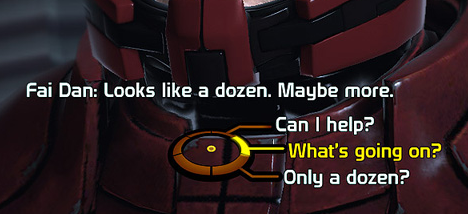First, consider the dialog-wheel. The dialog system is not just a handy way to handle choice structures on an xbox controller, it also expands your storytelling capacity. By selecting only the general gist of your response, and letting your fully voiced Shepard speak for him/herself, you get much more immersive conversations. Longer speeches and exchanges can be made, Shepard can reveal details about the world or his/her background that the player wasn't party to, or shoot an uncooperative criminal in the face. (It makes it a lot easier to be a jerk, as well.) You cede some of your direct control over the character in order to create a more interesting experience. So, while you can decide some of the parameters of Shepard's backstory and psych profile, and you can make the decisions that Shepard takes, there's a slight remove between you and "your" Shepard.
But, and this is what Rucka's analysis really brings out, once you cede any amount of control to the designer/storyteller "the onus is on the storyteller and not the player to fulfill the demands of the character’s journey." And I wish they did more towards that end. Shepard is, perhaps necessarily, the least-defined member of the Normandy's crew. Lots of people will have lots of impressions of what their Shepard will say and do. What the voice actors do is already amazing if you think about all the different variables they're juggling. So I can understand the lack of customized dialog for and reacting to the different choices and personalities you make. But that's not an excuse.
Mass Effect drives me up the theoretical wall because there are so many things it does so well, it makes us wish it could do the rest, and finally give us something that we could put up on the mantelpiece and point to when asked about why we game. It raises so much potential, so many possibilities, sets our minds racing about the possible ethical quandaries we could be faced with until we realize sadly that, no, the game doesn't actually figure that in. A lot of issues that initially seemed very important were basically hand-waved once you're given a ship and bad guys to point it at. You get precious few chances to express what's really going on with your character.
From Rucka's post:
[after being raised from the dead by a shadowy pro-human conspiracy] nowhere do you have the chance to say anything other than thank you. No opportunity to feel anything about what’s been done to you. And no one, not one person, asks you the obvious question. “What was it like being dead?"
You can play all of ME2 and none of this matters, certainly none of it effects the possible outcomes. But consider: your mission in the game is described, from the very start, as a “suicide mission.” You’re living your second life. Imagine what would’ve happened if you could’ve gone into that mission with a commitment to live, grappling with the fear of dying a second time; imagine what would’ve happened if you went into the mission believing that you were dead already, looking at it as an opportunity to correct Cerberus’ mistake.Those are the sorts of dramatic choices that really get me going. Of course, since it's a game, you would need to make sure it was balanced in terms of fair-but-challenging gameplay. I can imagine that the suicide mission portion of Mass Effect 2 went through a lot of iterations before they hit on what they thought was a good balance of danger and fairness, and I think the "loyalty missions" represented a pretty good attempt at linking character investment to survivability, while not acting as a guarantee (I think a lot of players lost squad members based on the non-obvious choice of who they picked to lead fire teams.) At bottom, though, I think Mass Effect doesn't force you to make enough hard decisions, and when you do it hasn't yet held you to the consequences of your actions. Although, since you can import your save, time may yet tell...
Now, when I say "cede control of the character," I'm obviously not asking Bioware to fill in the character and leave nothing up to the players (though they've apparently used that cession as the fig leaf for why they decided Shepard's sexual orientation for us.) I just want meaningful choices to define my character in a way that's been theoretically possible for a long time. It was the driving force of Planescape: Torment, and I hope it'll give an emotional core to Mass Effect 3.
¡Bonus link!: Potential new directions for dialog from an MIT prof: "Taking an axe to dialog trees"

No comments:
Post a Comment